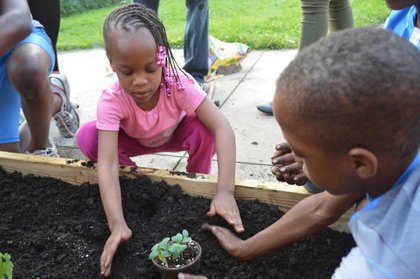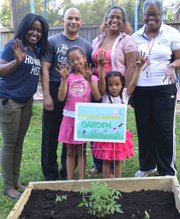WASHINGTON — They decided that the tomato plant would go in the middle and then they gently placed the other vegetable seedlings in select areas of their new garden, courtesy of the Howard University College of Medicine and Howard University Hospital.
Just two blocks away, the Muhammad family was as ecstatic as their children, Zahir, Ameer, Kaleem, Nailah scrambled about their new four-by-four foot garden, breaking up the soil, placing the cucumber, basil, bell pepper and the bean seeds in just the right location around their tomato plant. Then, they planted the sign that made it officially their garden.
The new gardeners proudly display their soil-covered hands as they christen their garden along with, from left, Stephanie Purnell of Howard, their father, Antonio Evans, mother, Michelle Phillips-Evans, and Dr. Michal Young of Howard University College of Medicine and Howard University Hospital.
The two families are part of the 50 Washington families with pre-school and elementary school age children who received free gardens this spring from Howard University.
Physicians, College of Medicine students and other volunteers planted gardens on Saturday, June 15, 2013. The project is called “My Garden,” a free program sponsored by Howard University, and designed to teach children and their parents about the importance of healthy eating and the joy of watching fruits and vegetables grow. The gardens are low maintenance and only need water and sun, and will be maintained by the children.
College of Medicine Dean, Dr. Mark S. Johnson said that the “My Garden” project represents one of the basic tenants of health care. “All health care starts with a healthy diet,. Unfortunately, sometimes families, particularly children, don’t have enough fruits and vegetables in their diets. The problem is even more significant in some of Washington’s food deserts. While this won’t fill all of a families needs when it comes to vegetables, it will help. And it’s a fun, educational experience for children and adults,” Dr. Johnson said.
The Fulton/Chester-Johnson family in southeast Washington was also one of the many families visited last Saturday. Sirahn Fulton, the family’s three-year-old girl, was very enthusiastic about getting her garden started. She didn’t talk much, but her eyes widened with excitement as she dug into the soil and with the help of her parents and grandparents, planted her vegetables. She took special pleasure in placing her own sign that proclaimed the area “Sirahn’s Garden.”
Dr. Michal Young, chair of the Department of Pediatrics and Child Health and Dr. Millicent Collins, also in the Department of Pediatrics, passed out brochures to the families, informing parents on how the vegetables were beneficial to healthy diets and provided the family tips on how to keep their gardens safe from pesky insects.
Washington families with pre-school and elementary school children interested in receiving a free garden next spring, can send their name, address, preferred email address and the names and ages of their children to Project Coordinator Ionnie McNeill at: ionniemcneill@yahoo.com.

